Haiti facing ‘humanitarian catastrophe’, says UN envoy
Officials say crises compounded by recent protests, looting of millions of dollars in humanitarian aid and ongoing ‘siege’ of a key fuel terminal.

Officials have warned of “new levels of desperation” in Haiti as multiple crises have been compounded by recent protests, the looting of millions of dollars in humanitarian aid and an ongoing “siege” of a key fuel terminal.
Speaking to the United Nations Security Council (UNSC) on Monday, Haiti’s envoy, Helen La Lime warned that “an economic crisis, a gang crisis and a political crisis have converged into a humanitarian catastrophe”.
Keep reading
list of 4 itemsMisery deepens in Haiti as unrest rages and water shortages bite
Photos: Haitian protesters call for the PM to resign
Haiti’s gangs: What can be done to loosen their grip?
The situation has worsened amid widespread looting and protests that followed Prime Minister Ariel Henry’s announcement of fuel price hikes on September 11.
About 4.9 million Haitians were already in a state of humanitarian need ahead of the latest unrest, Le Lime told the council.
“In the last two weeks alone, attacks on WFP (World Food Programme) have resulted in the loss of some 2,000 tonnes of food aid valued at close to $5m, that would have collectively supported up to 200,000 of the most vulnerable Haitians over the next month,” she said.
Lime said the Varreux fuel terminal in Port au Prince has been in a “state of siege” for more than a week, blocked off by criminal gangs who have dug trenches and obstructed roads with fuel containers around the site.
She added that fuel shortages have hobbled the country’s ability to function and have forced some hospitals to close.
The shortages have also forced the largest industrial park in Haiti, Caracol, to cease operating, “which could cause the loss of 12,000 jobs,” Haitian Foreign Minister Jean Victor Geneus told the council. He said private companies are expected to leave the Caribbean nation and it was unclear if schools would be able to open by the already postponed date of October 3.
Meanwhile, WFP Deputy Executive Director Valerie Guarnieri said food insecurity was expected to increase in Haiti this year, “surpassing the record high of 4.5 million people estimated to face crisis or worse levels of acute food insecurity, including 1.3 million people in emergency”.
In recent years, frequent natural disasters have wreaked havoc on Haiti’s economy, which has struggled since a devastating 2010 earthquake that killed as many as 220,000 people in the country of 11 million. The assassination of President Jovenel Moise in July of 2021 further cast the country into uncertainty.
Amid the insecurity, powerful gangs have jockeyed for influence, often leading to violent battles for control. For months, gangs have blocked roads from the capital to the country’s rural provinces, upending government services and complicating efforts by humanitarian groups to distribute aid.
During the meeting on Monday, Foreign Minister Geneus called on “robust support” from the international community for the Haitian police against armed gangs, while maintaining that violence was “generally under control and calm has returned to several parts of the country”.
The meeting comes after the UNSC, in July, adopted a resolution asking UN member states to ban the transfer of small arms to gangs operating in Haiti, while falling short of a Chinese demand to enforce an embargo.
The United States and Mexico, which drafted the July resolution, are working on a new text “proposing specific measures to enable the Security Council to address many challenges facing the people of Haiti,” US Ambassador Jeffrey DeLaurentis said.